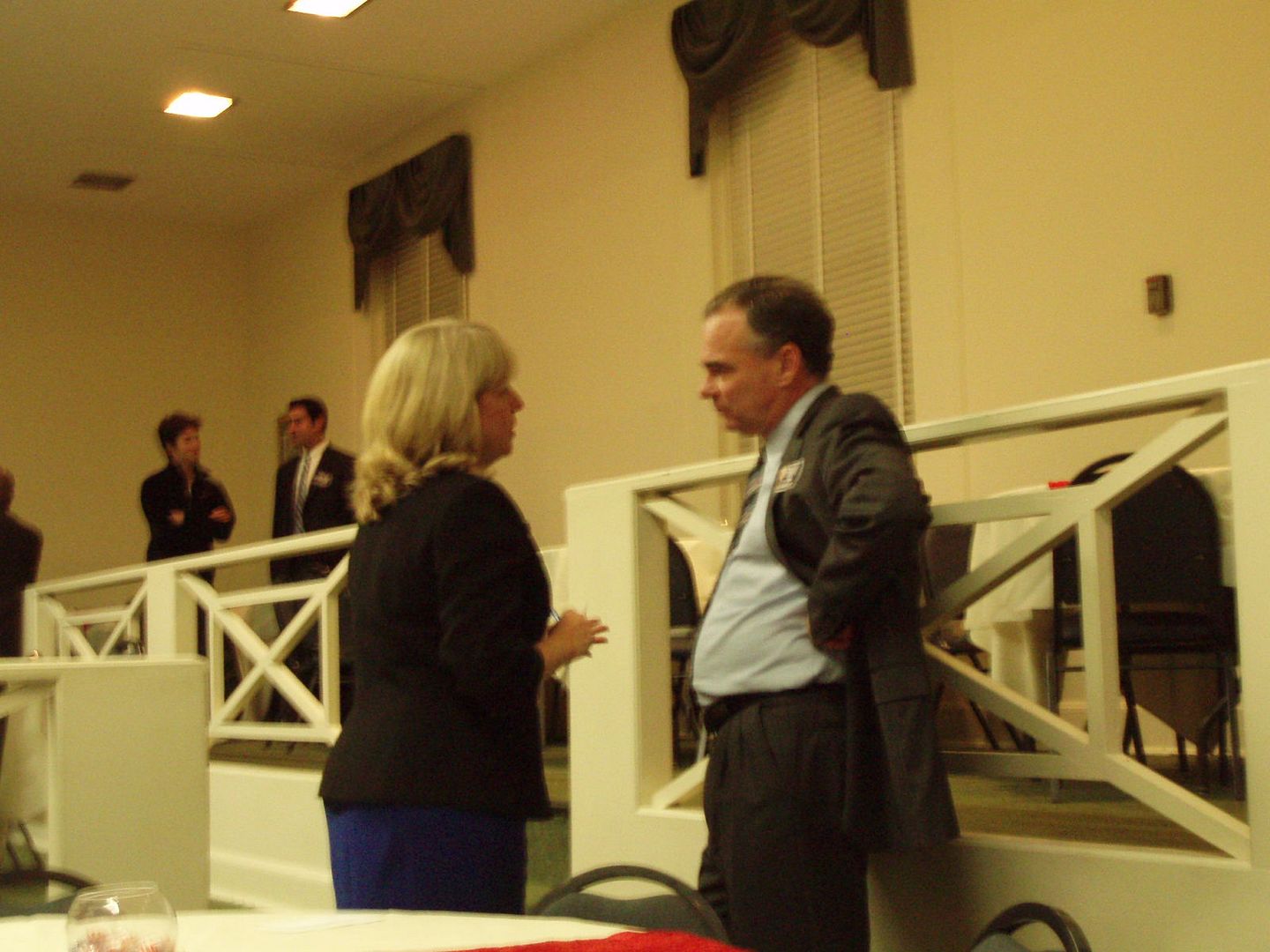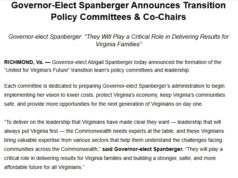 What a Democratic majority means to Governor Kaine is balance. Not to give short shrift to the House and local races, he believes that races like Ralph Northam’s are essential to maintain sane government in Virginia. That’s why he has made some 50 appearances on behalf of Virginia Democrats recently.
What a Democratic majority means to Governor Kaine is balance. Not to give short shrift to the House and local races, he believes that races like Ralph Northam’s are essential to maintain sane government in Virginia. That’s why he has made some 50 appearances on behalf of Virginia Democrats recently.
“Holding on to the Senate majority is the thing we’ve got to go after, hook, line, and sinker, tooth and nail, every minute, every hour , blood sweat and tears between now and next Tuesday.” – Governor Tim Kaine
The former Governor offered some thoughts last evening at an event for Senator Northam (D-6th) about what we can do that will really matter and why what we do matters maybe this year more than most. From his perspective, right now in Richmond, the Democratic Senate is the balance. With a Republican Governor, Lieutenant Governor, and an Attorney General who is fighting against science, arguing climate change does not exist, fighting to turn back the clock as far as protecting employees on the grounds of their sexual orientation, that balance is essential.
The Democratic majority Senate and the diversity of committee chairs creates the ingredient of balance in Virginia government. With the Democrats in control there are six or seven women committee chairs and four African American chairs. When the Republicans held the balance, there were no women or minorities serving as chairs. They might have been fine men, but they did not represent the diversity of Virginia.
“So much is at stake. I do not have to tell you. You know what is at stake here, in the final days, in the Senate of Virginia. We have got to push back and make sure that the right wing extremist agendas are not advanced in the Commonwealth of Virginia. That is not the Virginia Way.” – Delegate Paula Miller (D-87th) whose District melted away
What the Democratic Senate has done, Kaine argued, is twofold: first, stop bad things originating in the House and second, advance important priorities, even though those that go over to the House may be killed. Using the budget as an example he explained that the House will put out a budget that is bad for education and the Senate will develop one that is good so that at the conference table, though not getting everything Democrats want, we get more than a Republican Senate would provide. It works this way, he says, on a whole series of issues such as smart economic development strategies and transportation solutions.
While the House races are important to Kaine, he allows the redistricting was done in such a way that it is “going to make it extremely difficult for the Democrats to get the majority in the House in this cycle.” However he looks to pick up a couple of seats there so that we can walk away saying that we are on the rebound, having won a couple of surprise races and with the prospect of having better numbers in the future.
His second point is that we are important, maybe more important than in any other political year. The even years with Federal elections are big turnout years. In one of the odd years there are statewide races where the race for Governor, at least, attracts more interest. But in this the second odd year, the off-off year, there are no Presidential, member of Congress, or statewide races that draw people out to vote. That makes this the lowest turnout year of any in the four year cycle. That makes each and every one of us important because low turnout races tend to be close. There are more races decided in the off-off year by close margins than in any other.
“I am a guy who knows something about close races. I won my first race for city council by 91 votes. Then I was running as a city councilman after I’d been in a couple of terms to a city that still chose the mayor from among city council. I hoped I might be mayor but I wasn’t going to be mayor there was someone else who was going to be mayor if he got elected, not me. And I can assure you if I had not been mayor of Richmond I would not have been Lieutenant Governor and if I had not been Lieutenant Governor I would not have been Governor and I would not be running for the US Senate. And I was not going to be mayor. But the guy everybody thought was going to be mayor lost his race by six votes. If just four people in that race had changed their votes, I would never have been mayor, probably would have never been elected to Lieutenant Governor or anything else. And so, that was in a low turnout election.” – Governor Tim Kaine
So that is where Kaine says we come in. In a low turnout election, the phone call that we make, the door that we knock on, the neighbor or coworker or person in the church we talk to to persuade: that might be the deciding vote. Tim Kaine is absolutely certain that come next Tuesday night there will be races decided by less than a couple of hundred votes. So, we have the ability to make certain that the close races come out with our candidates on top.




![Saturday News: “Trump’s latest tariff TACO probably won’t make your life more affordable”; “The Epstein Email Cache: 2,300 Messages, Many of Which Mention Trump”; “[MTG] questions if Trump is still the ‘America First’ president”; “Jim Ryan tells all: ‘What did the Governor know, when did he know it?’”](https://bluevirginia.us/wp-content/uploads/2025/11/montage1115-238x178.jpg)







![Saturday News: “Trump’s latest tariff TACO probably won’t make your life more affordable”; “The Epstein Email Cache: 2,300 Messages, Many of Which Mention Trump”; “[MTG] questions if Trump is still the ‘America First’ president”; “Jim Ryan tells all: ‘What did the Governor know, when did he know it?’”](https://bluevirginia.us/wp-content/uploads/2025/11/montage1115-100x75.jpg)
